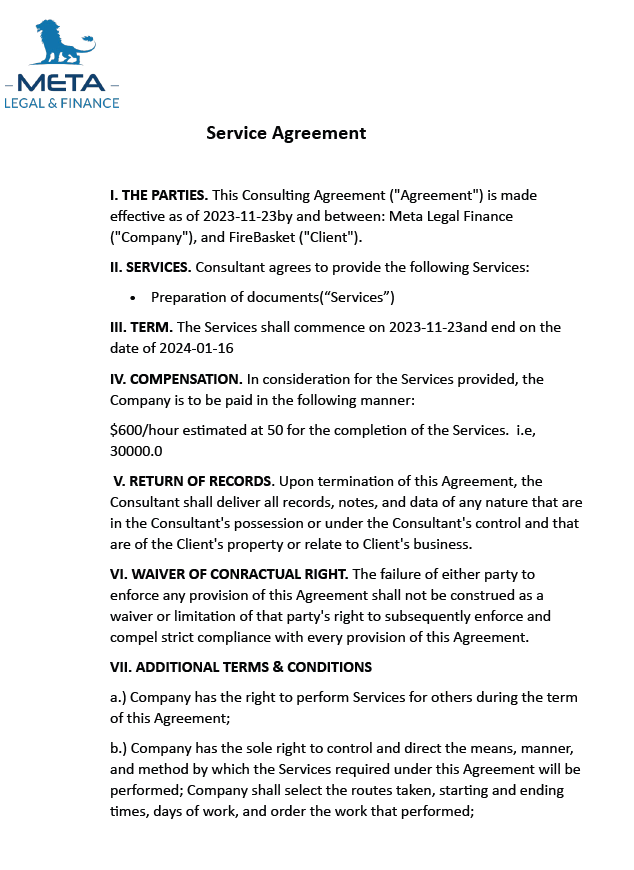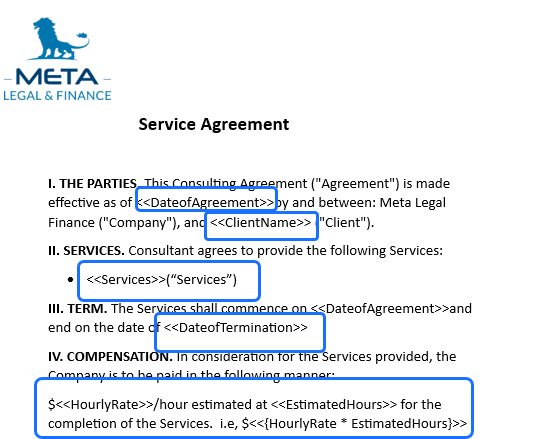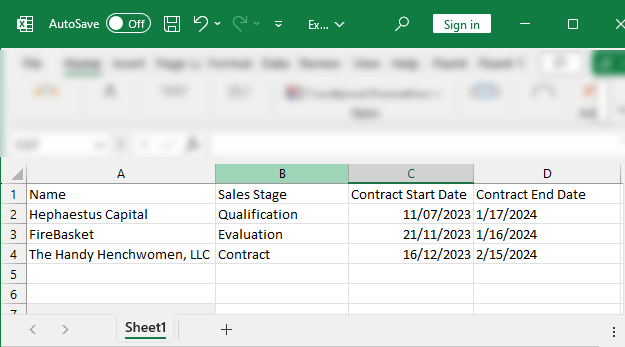Docmosis Cloud is a template-based document generation service that can be used via a REST API.
This article is a guide to:
- creating an Airtable base.
- sending data stored in Airtable to the Docmosis Cloud service using Zapier
- generating a PDF document with the data
The Cloud service merges the data with a Microsoft Word template to generate a PDF letter, like this one:
Download the generated document
Setting up Docmosis
Step 1: Login to the Cloud console
If you don't already have a Cloud account, you can sign up for a Docmosis free trial here.
Once you have an account, log in to the Cloud console.
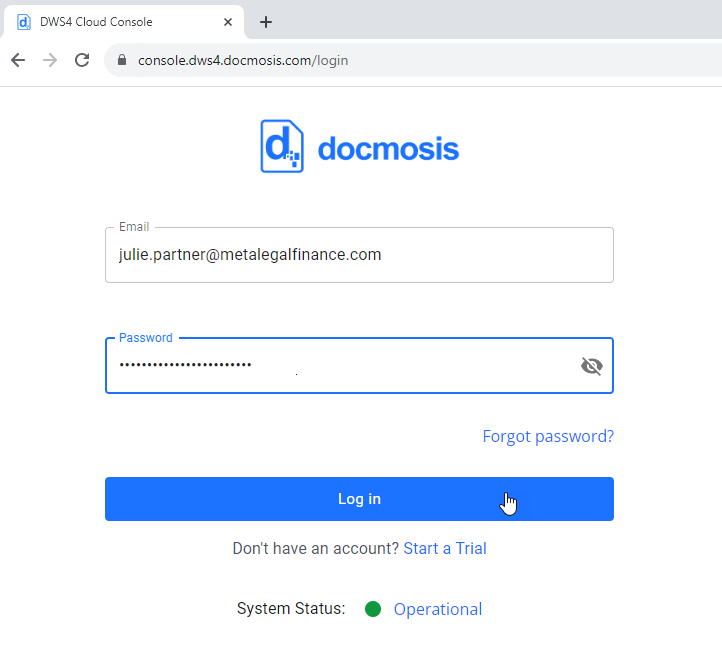
Step 2: Download the sample template
Docmosis templates are ordinary Microsoft Word documents, with special placeholders that Docmosis Cloud service replaces with data to generate the document.
Click on the image or link below, to download the sample template: ServiceAgreement.docx.
The ServiceAgreement.docx template is ready to use, without any further changes. You can see the placeholders in the template, below.
Note: The placeholders serve as unique identifiers, helping Docmosis Cloud service in determining the data's placement.
For example, in the above template if you decide to change "DateofAgreement" to "StartDate" it would not effect the functionality of template as long as you replace every instance of "DateofAgreement" with "StartDate".
Step 3: Upload the template
Create a new top-level folder to help organize your templates. In this case the folder is named Airtable.
Upload the ServiceAgreement.docx template to the new folder.
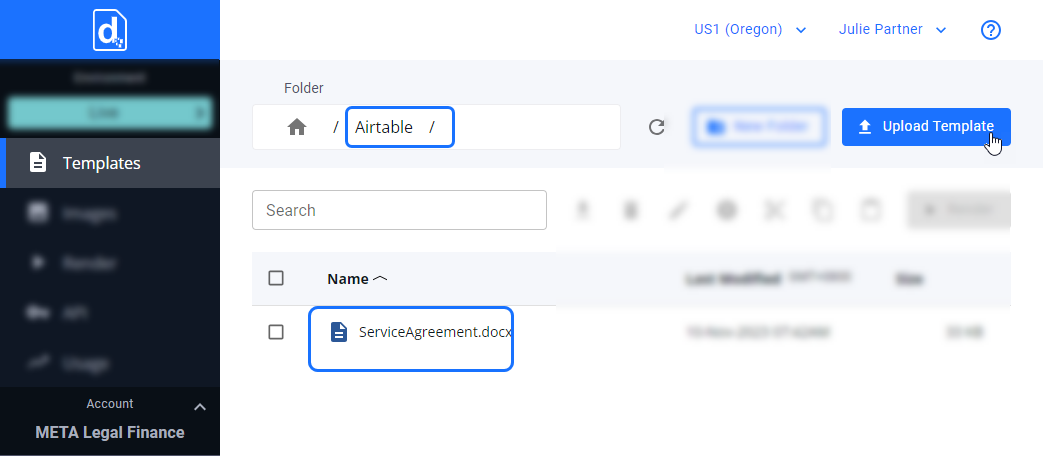
Step 4: Get the Docmosis Cloud Access key and API URL
You will need your access key and URL when setting up the call to Docmosis Cloud in Zapier. Copy these to an editor such as Notepad, to be used later.
Note: In this example, we used the US (Oregon) processing location in the Docmosis Cloud service, for storing the template and generating the document. You can use your default processing location, when following this example.
Setting up Airtable
Step 5: Download the Excel
Airtable offers a feature for importing data from Excel sheets, which will be utilized in this tutorial. Please download the Excel sheet provided below, as it will be necessary for uploading into Airtable in the subsequent step.
Step 6: Upload Excel to Airtable
Create a new base, then upload the data from excel sheet using either of the two buttons.
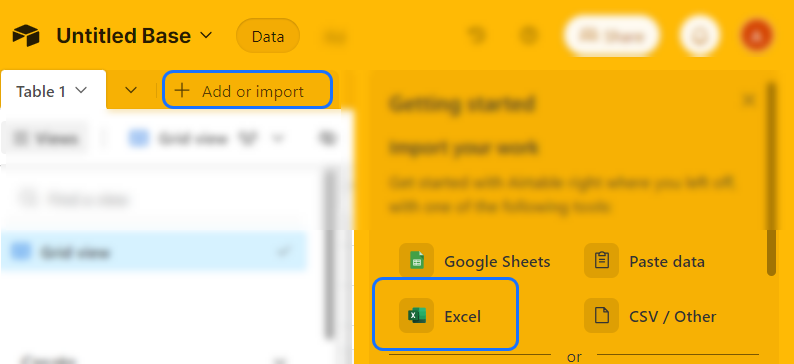
Step 7: Add a Last modified Field
For a Zap to trigger on a new or updated record event in Airtable, the table must include a "Last Modified" column.
Click on the "+" to add a new field and choose" Last modified by" field type.
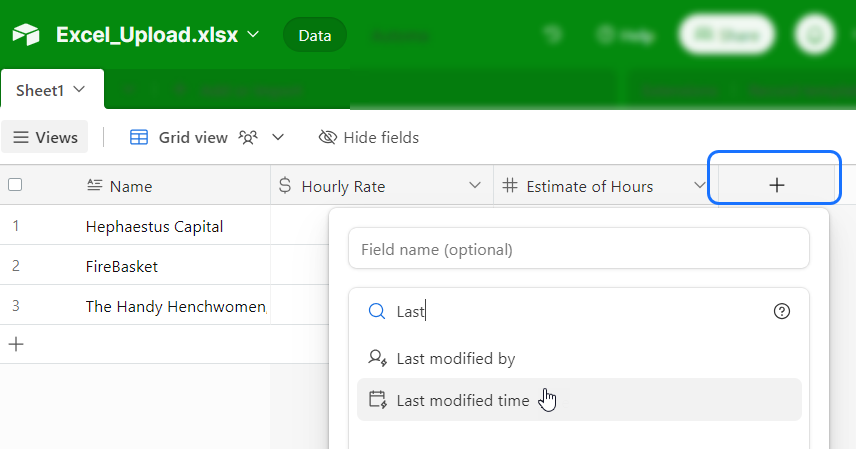
Configure Zapier
Step 8: Set up a Zap with Airtable as trigger
Log in to Zapier. Click on any of the "Create Zap" buttons. Optionally create a folder.
Click on trigger step then search and select Airtable as trigger from the "Change trigger" pop-up.
- In the "App & event" section choose "New or Updated Record " as Event
- In the "Account" section Authenticate your Airtable account
- Choose the desired Base and Table in the "Trigger" section. Optionally choose to limit to a View.
- "Test" to see the rows are populated as data
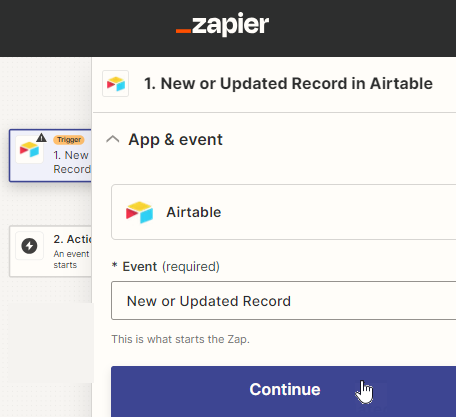
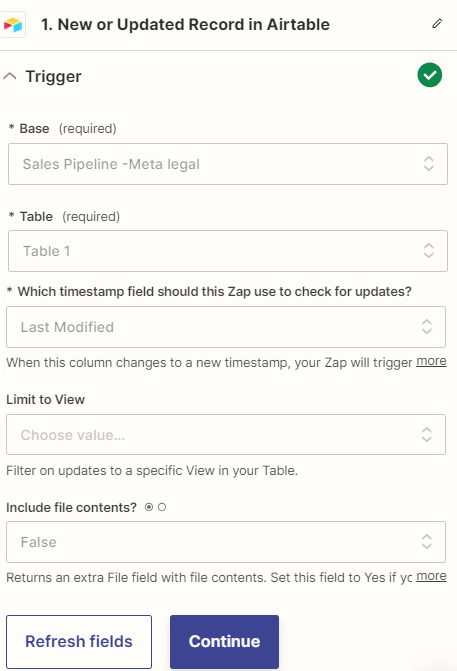
Step 9: Configure Docmosis as an action.
Click on the Action section, then search and select Docmosis in the "Change action" pop-up.
In the "App & event" section, Select "Generate a Document" as Event, then click continue.
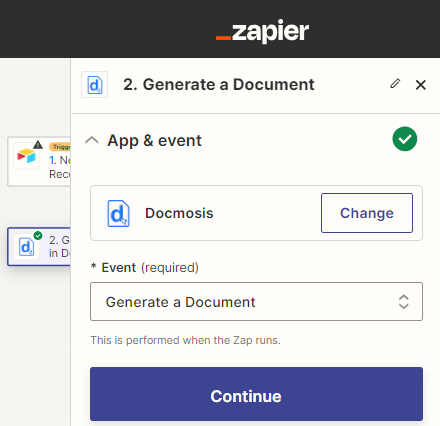
Step 10: Connect your Docmosis Cloud account to Zapier
To connect Docmosis with Zapier, first click on the "Sign in" button located in the "Account" section.
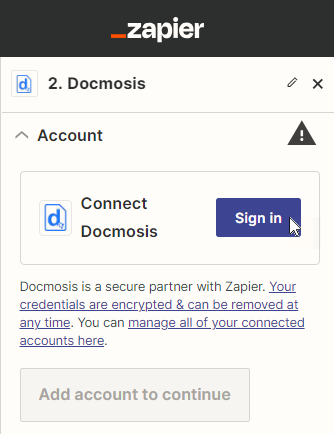
This will open a new authentication window, where you must
- choose the version of Docmosis Cloud service
- enter your access Key (from Step 4 above)
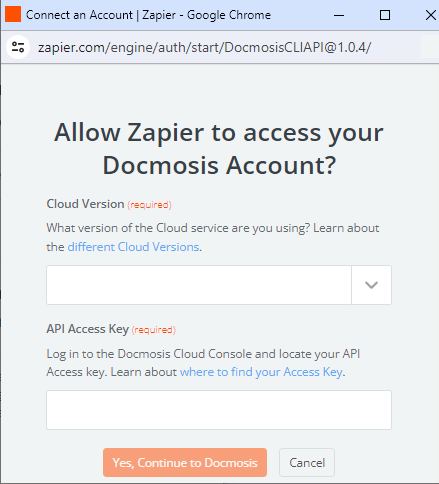
Step 11: Fetch template
In the "Action" section, fetch the template by providing
- Processing location
- Template name
Docmosis Cloud service requires a Output filename and data for Placeholders to generate a document.
- Output filename must be specified
Note: Output filename must include an extension i.,e ".pdf" or ".docx", this determines the format of the generated document.
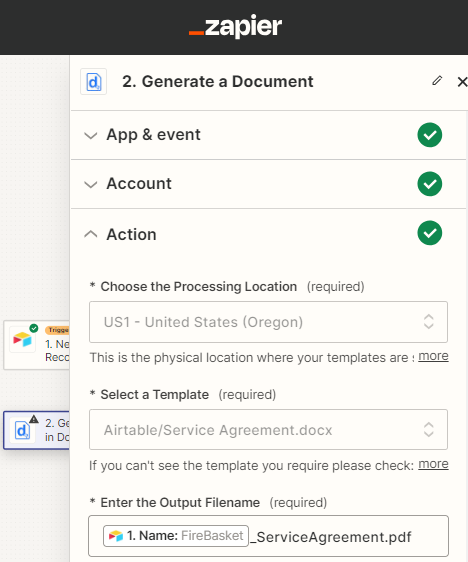 Step 12: Map the Airtable fields to the Docmosis Placeholders
Step 12: Map the Airtable fields to the Docmosis Placeholders
To map Airtable Records with Docmosis placeholders, simply select the desired Airtable field from the dropdown list.
Note: The Docmosis placeholders are automatically populated once template is selected. The Airtable column headers are shown as a dropdown list when the "Enter text or insert data" box is clicked.
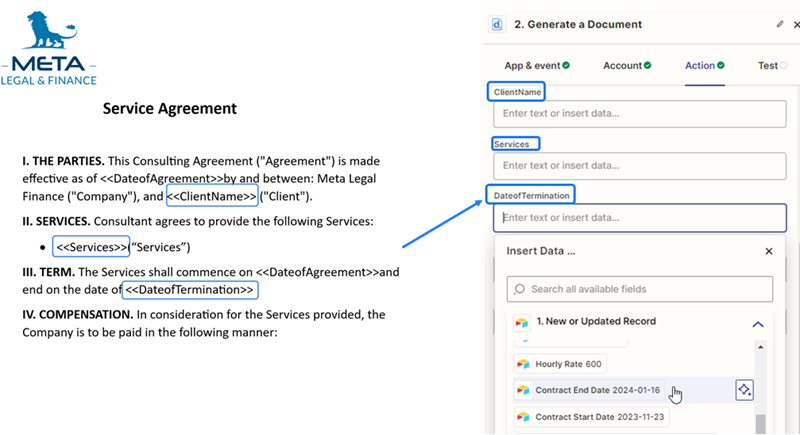
Step 13: Set up a email delivery.
This is the easiest way to confirm that all settings are correct. Later on you can add more steps to your Zap to perform further actions with the document.
To setup email delivery enter the email, subject and body of email in the corresponding fields.
Note: From a Docmosis Cloud Free Trail account emails can only be sent to the Docmosis account admin(s).
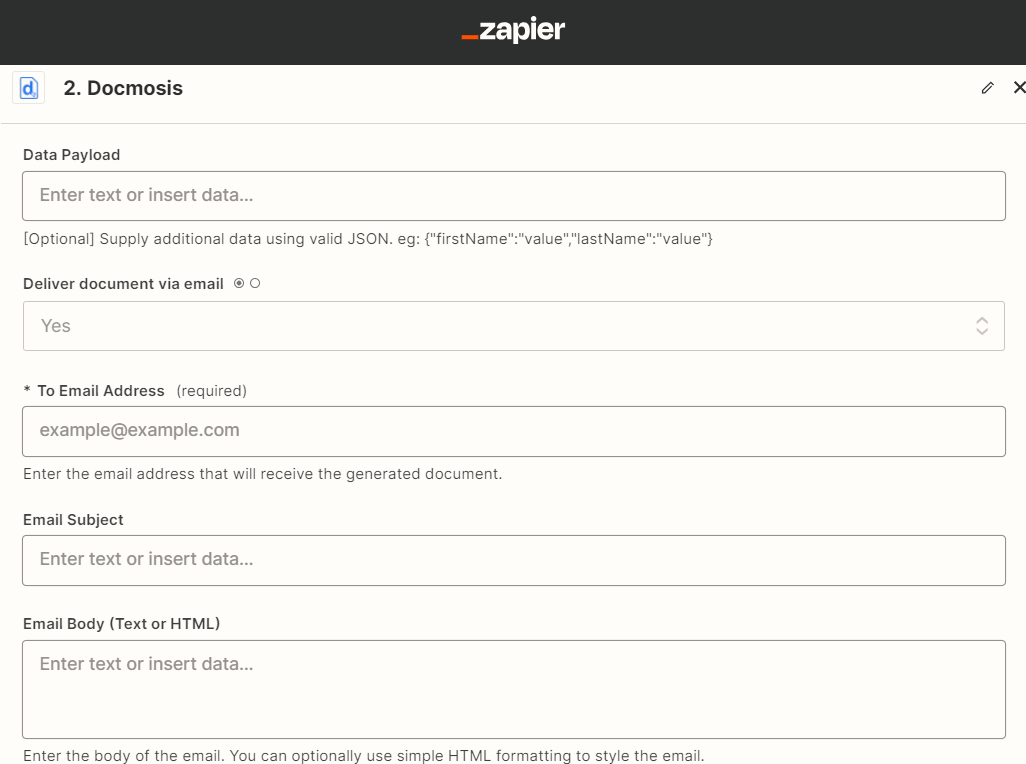
Step 14: Test the Zap.
Check your email. The generated document will arrive in the email as an attachment.
That's it! Publish the Zap and every time the form is completed you will receive a generated document.


